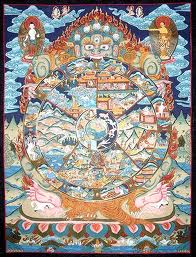
Although whatever is understood by transmigration or reincarnation does not strictly belong in this discussion on the “problem”, or the “reality” of death, it is so entrenched in people’s minds due to cultural and religious accretions, that a short account of it is not altogether out of place here. In the milieu of Hindu and Buddhist traditions reincarnation occupies the main doctrinal position in their exoteric or “religious” aspects, apart from belief in and worship of a deity or deities, and second only to the doctrine of karma – to which it is intimately related. Death of the body – the ‘gross body’ – is a foregone conclusion once it is irreversible (biological death).
A conventional account of reincarnation is as follows: ‘as for the jiva-atman carrying these vrittis, if during his lifetime the individual had performed some special acts of merit (punya) or demerit (papa), then the jiva-atman would proceed to heaven or hell. After spending his special karma-phala there, he comes back to the earth’. A more elaborate description is that once the seeker realizes nirguna Brahman he/she merges with Him/It, thus attaining immediate liberation (sadya mukti)’.Those who are eager to go beyond paths [the journey of life here and hereafter] tread no path’ (com. on Mu U. lll.2.6). ‘Just as the footmarks of birds cannot be traced in the sky or of fish in water, so is the departure of the illumined’ (Mahabharata). These two quotations are taken from ‘Methods of Knowledge’ – According to Advaita Vedanta’, by Swami Satprakashananda, p. 299. Continue reading
